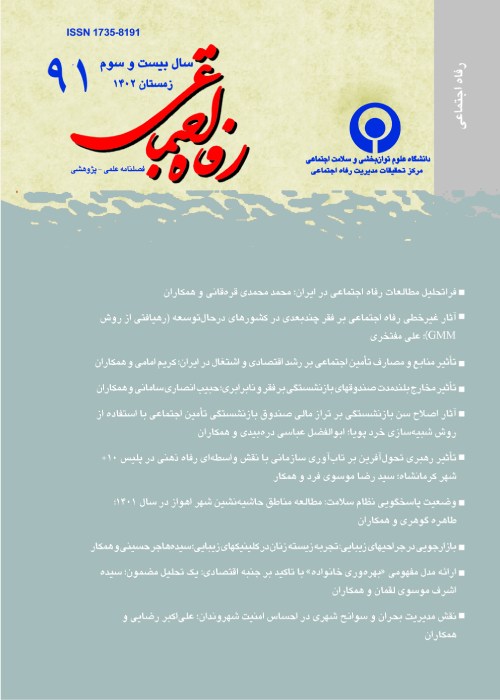The Relation of Social Commitment and Social Control with Addiction
Author(s):
Abstract:
Objectives
Addiction, as a social phenomenon, is depended on several personal and collective factors and it is influenced by social system constraints. In normative system of societies, addiction is considered as a social harm or disease. Our main problem in this research is to analyze how people's commitment and social control in different aspects of social system can affect getting or not getting addicted. Besides, we will consider how we can explain their influence. In explaining this problem, two Theories have been used. First, Durkheim's Anomy theory which is based on independence of individual to social institutions and organizations such as family, school and etc. that caused behavioral deviations, in addition, the foundation of social behavior can be founded in social factors. Second, Social Control theory which found on individual who has potential to disobey the law moreover, modern society has provided opportunity for many illegal activities. Some criminal behaviors as using drugs and etc. has created entertainment that ended to immediate enjoyment.Method
The research method is Survey and our statistical population has been determined using random sampling method amongst addicts having been documented in the Office of Fighting against Narcotic drugs in a border city of Iran (Khaf, Khorasan's province). Data gathering has been done through assessing available documents in the mentioned office and using by questionnaires among 100 addicts and 100 Non-addicts (as the control group) and Performing validity and reliability tests for independent variables (logistic Regression and other tests).Finding
based on data gathering of this research, 62% of addictions are under low social commitment and just 5% of this indicator is estimated high. All of them have only used opium. The average duration of using opium has been 8/56 years. Rate of dependency on addicted group is considered 14% high, 49% average and 37% low. The average of social commitment and social control is 99% in significant level among addicts are lower than Non-addicts.Upon backward multiple logistic Regressions, using addiction estimate based on social commitment, the probability of addiction among people with low social commitment is high, considering 72% probability level. Also, the probability of addiction under the condition of low social control is high, considering 72% probability level. Statistics have implied that 83% of Non-addicts are under low social control.Result
Results from descriptive and explanatory findings imply that there is a meaningful relationship between social commitment and control and addiction phenomenon. The effect of social factors on addiction and expansion are determinate. The addicts are not separated from their environment and society. Social dependence and relationship make commitment. some dependence such as family, an institution and commitment to common activities like education, employment, states, saving, occupation in ordinary activity and belief to ethical codes social norms which are samples of commitments. In the result of this research, the appropriate solution for reducing addition has been reinforcement of socialization, collective conscientiousness and respect to social and ethical norms.Keywords:
Language:
Persian
Published:
Social Welfare Quarterly, Volume:9 Issue: 34, 2009
Page:
187
magiran.com/p1244590
دانلود و مطالعه متن این مقاله با یکی از روشهای زیر امکان پذیر است:
اشتراک شخصی
با عضویت و پرداخت آنلاین حق اشتراک یکساله به مبلغ 1,390,000ريال میتوانید 70 عنوان مطلب دانلود کنید!
اشتراک سازمانی
به کتابخانه دانشگاه یا محل کار خود پیشنهاد کنید تا اشتراک سازمانی این پایگاه را برای دسترسی نامحدود همه کاربران به متن مطالب تهیه نمایند!
توجه!
- حق عضویت دریافتی صرف حمایت از نشریات عضو و نگهداری، تکمیل و توسعه مگیران میشود.
- پرداخت حق اشتراک و دانلود مقالات اجازه بازنشر آن در سایر رسانههای چاپی و دیجیتال را به کاربر نمیدهد.
In order to view content subscription is required
Personal subscription
Subscribe magiran.com for 70 € euros via PayPal and download 70 articles during a year.
Organization subscription
Please contact us to subscribe your university or library for unlimited access!



